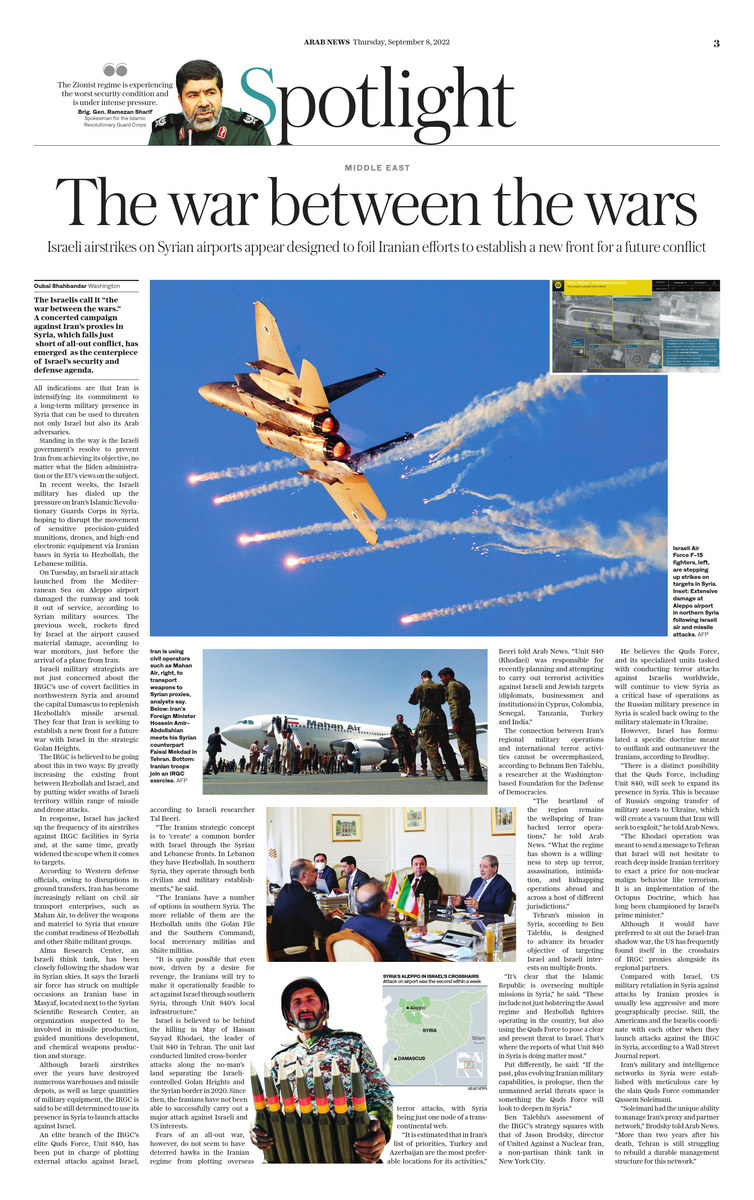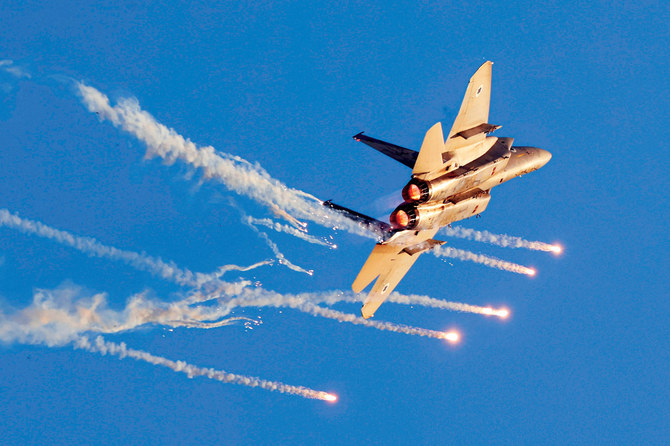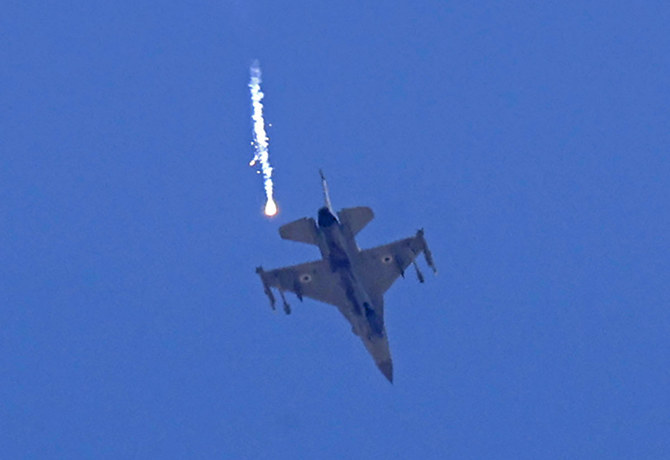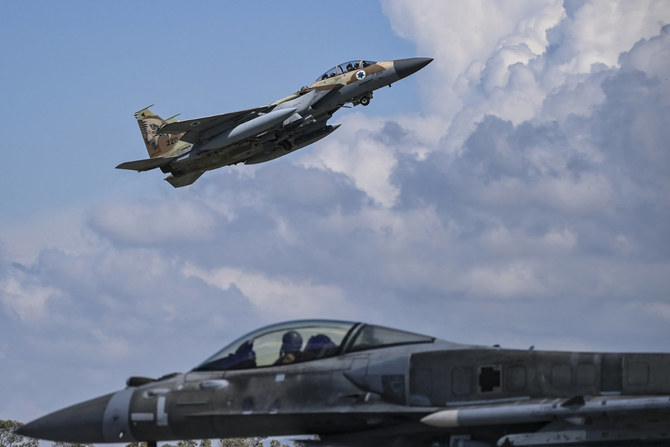WASHINGTON: The Israelis call it “the war between the wars.” A concerted campaign against Iran’s proxies in Syria, which falls just short of the threshold for all-out war, has emerged as the centerpiece of Israel’s security and defense agenda.
All indications are that Iran is intensifying its commitment to a long-term military presence in Syria that can be used to threaten not only Israel but also its Arab adversaries.
Standing in the way is the Israeli government’s resolve to prevent Iran from achieving its objective, no matter what the Biden administration or the European Union’s views on the subject.
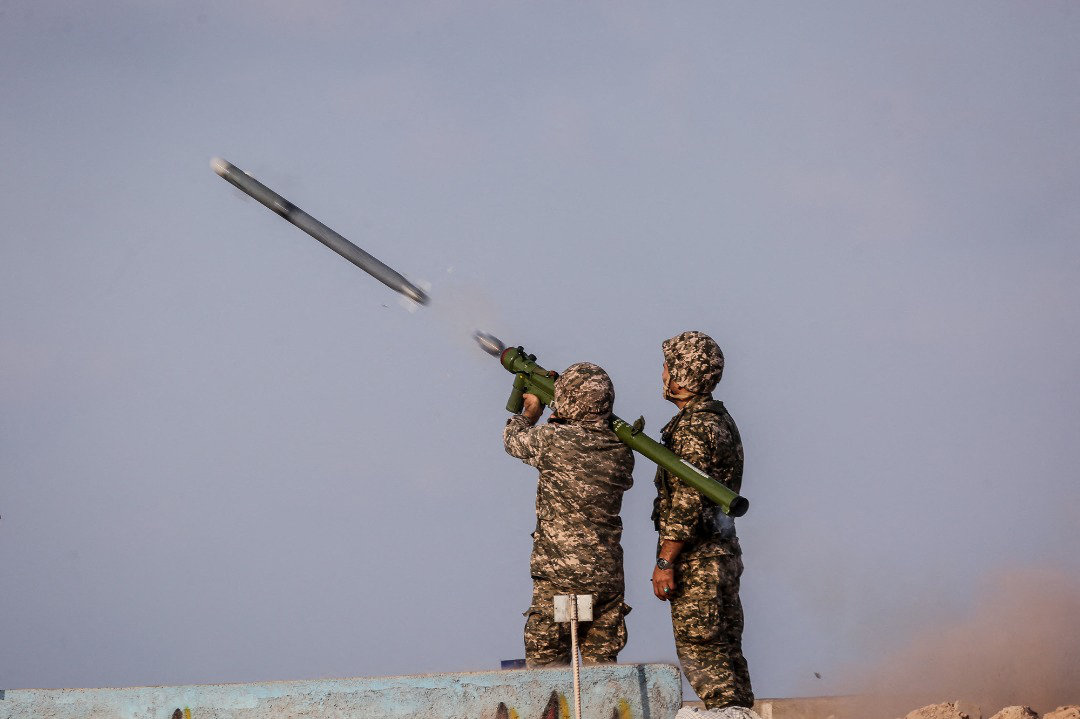
Iran’s IGRC has reportedly been moving sensitive precision-guided munitions and high-end electronic equipment to Lebanon’s Hezbollah militia via Iranian bases in Syria. (AFP)
In recent weeks, the Israeli military has dialed up the pressure on Iran’s Islamic Revolutionary Guards Corps (IRGC) in Syria, hoping to disrupt the movement of sensitive precision-guided munitions, drones, and high-end electronic equipment via Iranian bases in Syria to Hezbollah, the Lebanese militia.
On Tuesday, an Israeli air attack launched from the Mediterranean Sea on Aleppo airport damaged the runway and took it out of service, according to Syrian military sources. The previous week, rockets fired by Israel at the airport caused material damage, according to war monitors, just before the arrival of a plane from Iran.
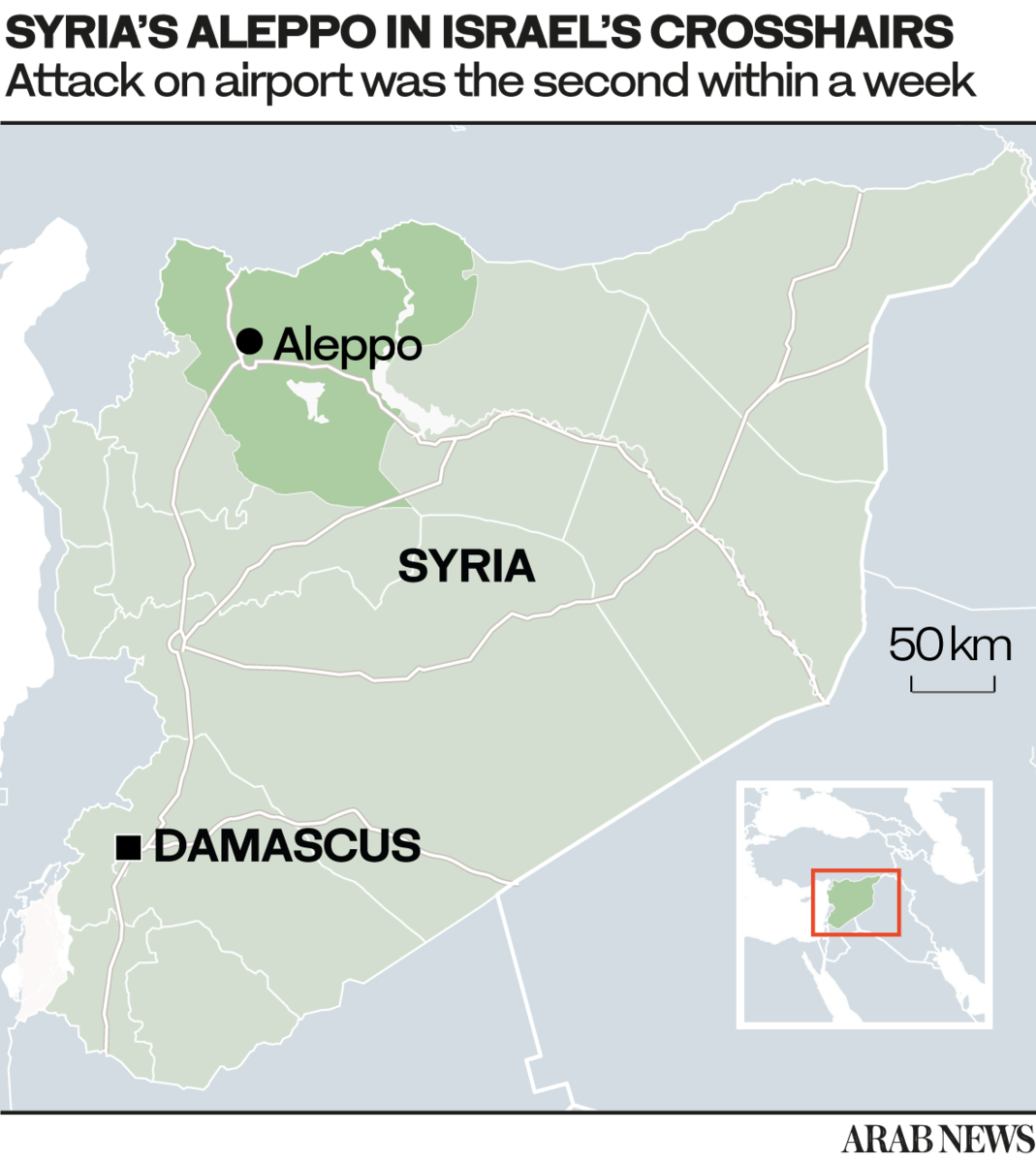
Israeli military strategists are not just concerned about the IRGC’s use of covert facilities in northwestern Syria and around the capital Damascus to replenish Hezbollah’s missile arsenal. They fear that Iran is seeking to establish a new front for a future war with Israel in the strategic Golan Heights.
The IRGC is believed to be going about this in two ways: By greatly increasing the existing front between Hezbollah and Israel and by putting wider swaths of Israeli territory within range of missile and drone attacks.
In response, Israel has jacked up the frequency of its air strikes against IRGC facilities in Syria and, at the same time, greatly widened the scope when it comes to targets.
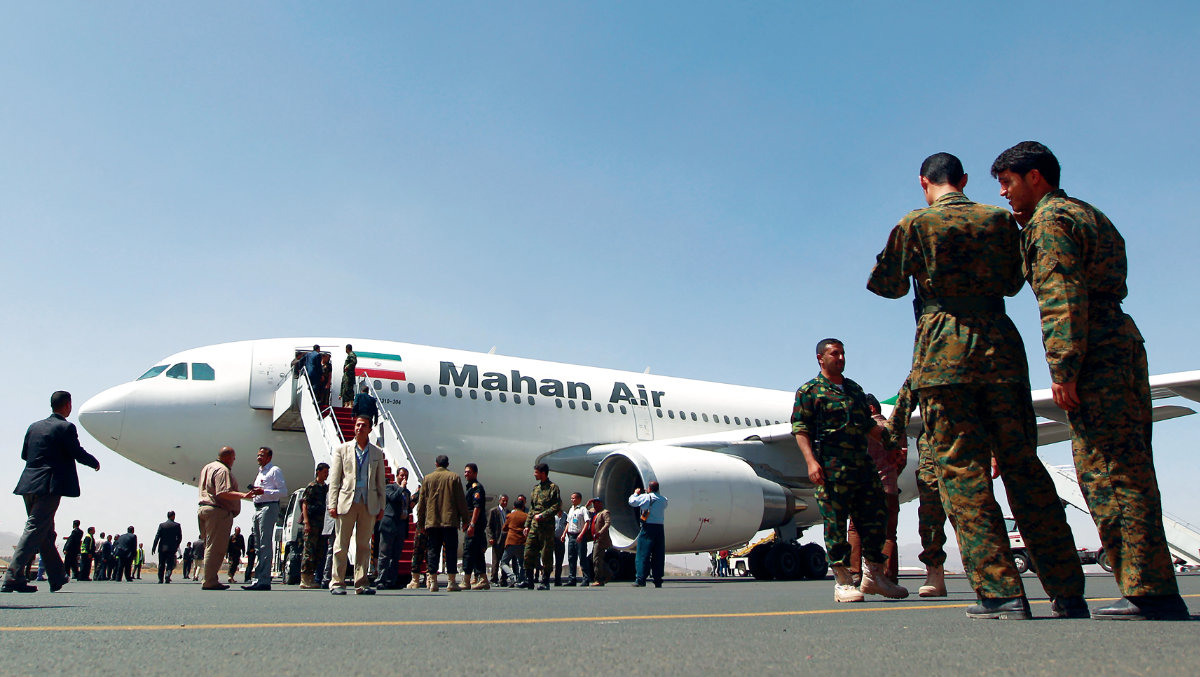
Iran is using civil operators such as Mahan Air to transport weapons to Syrian proxies, analysts say. (AFP)
According to Western defense officials, owing to disruptions in ground transfers, Iran has become increasingly reliant on civil air transport enterprises, such as Mahan Air, to deliver the weapons and materiel to Syria that ensure the combat readiness of Hezbollah and other Shiite militant groups.
Before the latest strikes on Damascus and Aleppo airports, Israeli intelligence services reportedly detected a notable uptick in covert weapons flights involving commercial aircraft.
The runway at Damascus airport suffered its most severe damage earlier this summer, but just weeks after it was repaired, the Israeli air force struck again on Aug. 31. The same day the airport in Aleppo and its runway suffered damage when a suspected IRGC plane tried to use the facility after failing to land in Damascus.
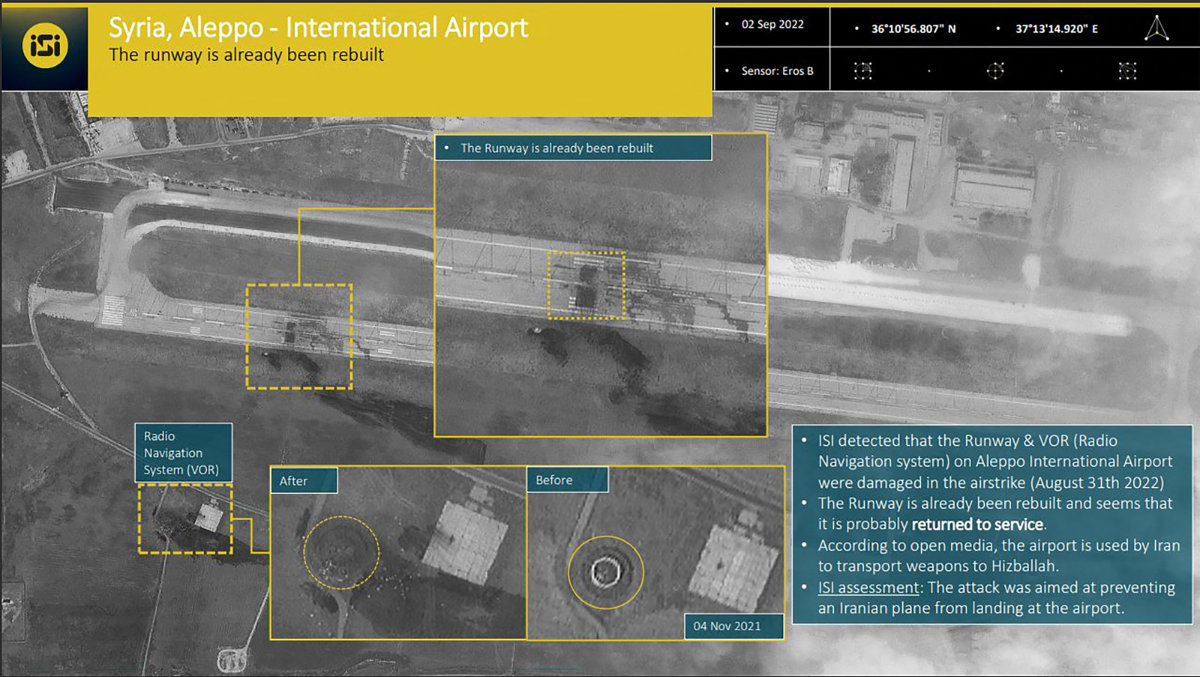
This handout file photo released by ImageSat International shows a satellite image depicting the damage at Syria’s Aleppo airport following Israeli strikes on August 31. (AFP)
Alma Research Center, an Israeli think tank, has been closely following the ongoing shadow war in Syrian skies. It says the Israeli air force has struck on multiple occasions an Iranian base in Masyaf, located next to the Syrian Scientific Research Center, an organization suspected to be involved in missile production, guided munitions development, and chemical weapons production and storage.
Although Israeli airstrikes over the years have destroyed numerous warehouses and missile depots as well as large quantities of military equipment, the IRGC is said to be still determined to use its presence in Syria to launch attacks against Israel.
A secret operational branch of the IRGC’s elite Quds Force, Unit 840, has been put in charge of plotting external attacks against Israel, according to Israeli researcher Tal Beeri.
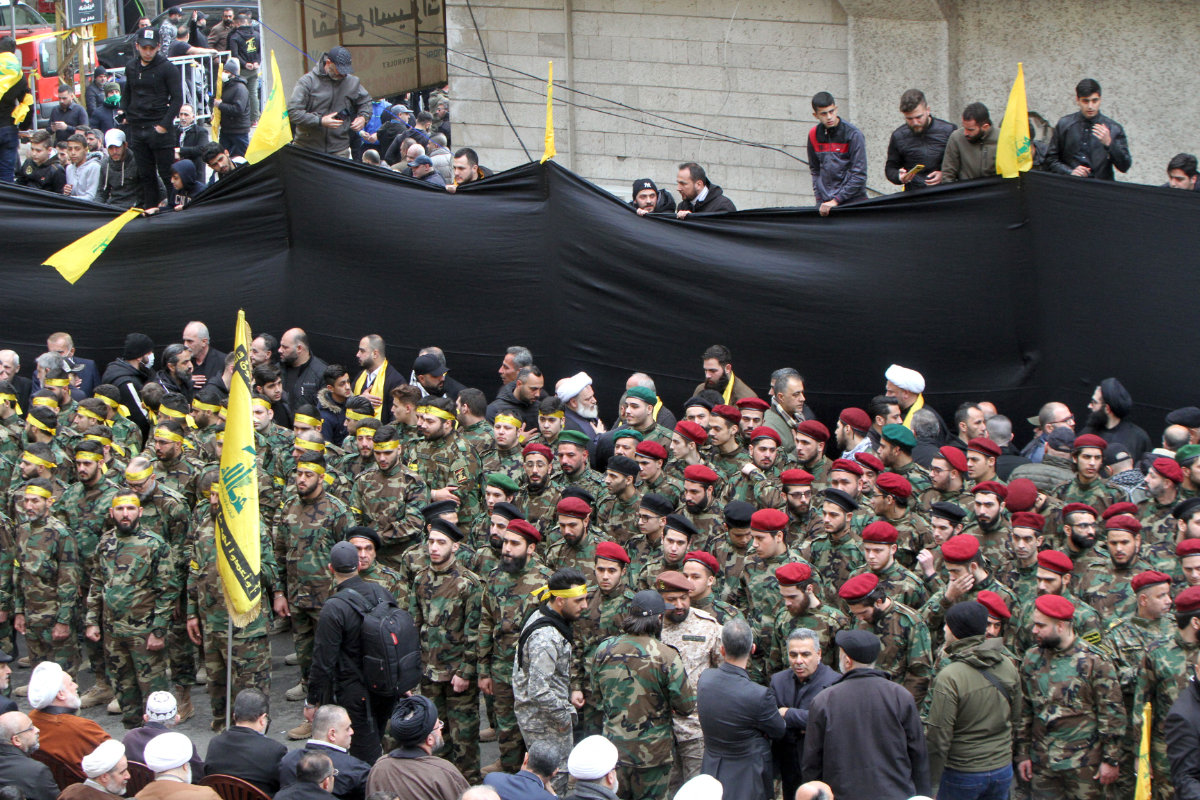
Members of Lebanon’s Shiite Hezbollah movement take part in a funeral procession for fighters of the group killed in Syria while fighting for Iran and the Assad regime. (AFP file photo)
“The Iranian strategic concept is to ‘create’ a common border with Israel through the Syrian and Lebanese fronts. In Lebanon they have Hezbollah. In southern Syria, they operate through both civilian and military establishments,” he said.
“The Iranians have a number of options in southern Syria. The more reliable of them are the Hezbollah units (the Golan File and the Southern Command), local mercenary militias and Shiite militias.
“It is quite possible that even now, driven by a desire for revenge, the Iranians will try to make it operationally feasible to act against Israel through southern Syria, through Unit 840’s local infrastructure.”
FASTFACTS
Iran’s enriched uranium stockpile is now more than 19 times the limit set out in the 2015 nuclear deal.
Its stockpile as of Aug. 21 stood at an estimated 3,940kg, up 131.6kg on the IAEA’s last quarterly report.
(Source: IAEA)
Israel is believed to be behind the killing in May of Hassan Sayyad Khodaei, the leader of Unit 840 in Tehran. The unit last conducted limited cross-border attacks along the no-man’s land separating the Israeli-controlled Golan Heights and the Syrian border in 2020. Since then, the Iranians have not been able to successfully carry out a major attack against Israeli and American interests.
However, analysts believe the synergistic interaction between IRGC operatives in Syria and terror agents across the Middle East poses a security threat to other countries.
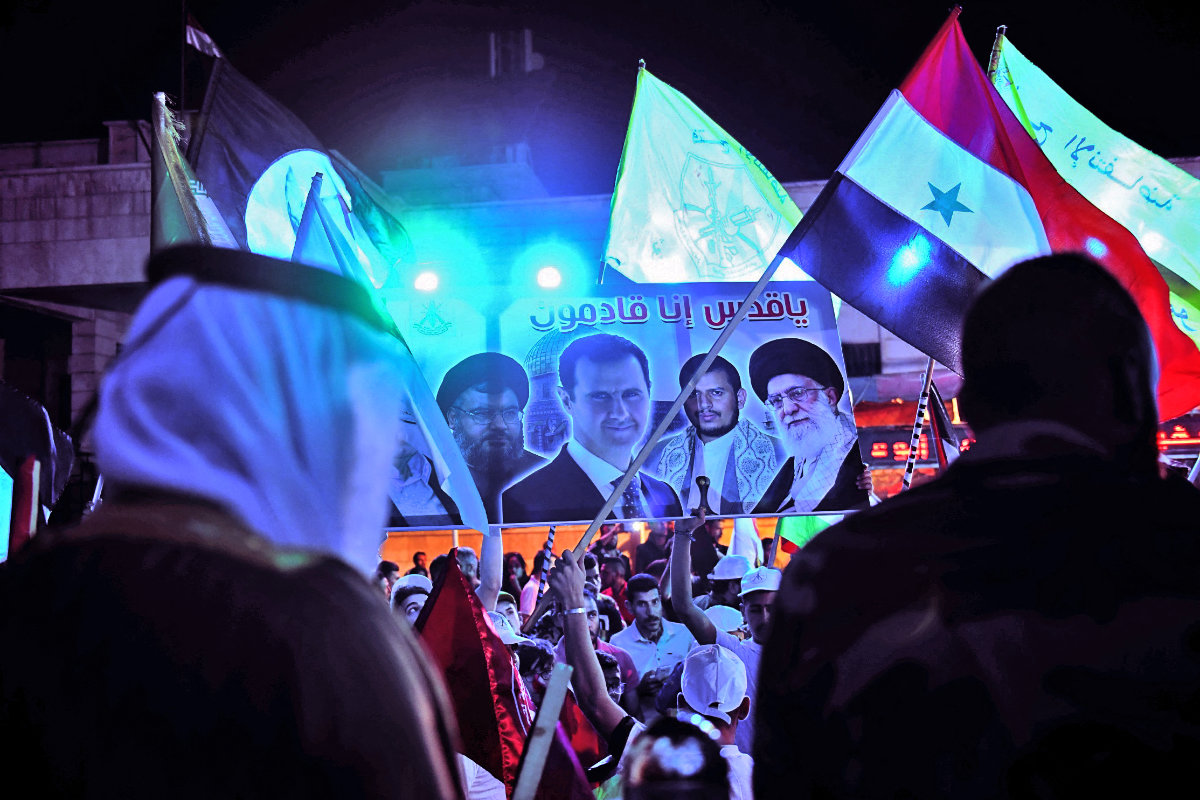
Syrians lift a placard depicting the leaders of Iran, Syria and the Hezbollah and Houthi terror movements at the Al-Nayrab camp for Palestinian refugees east of Aleppo on May 7, 2021. (AFP)
The nexus between the two groups is embodied by Quds Force commander Gen. Javad Ghaffari, who is believed to be leading the IRGC Intelligence Organization’s mission to target Israelis abroad, including this summer’s plot targeting Israeli diplomats that was thwarted as part of a joint Mossad and Turkish intelligence operation.
Ghaffari was the former top Quds Force commander in Syria, where he earned the moniker the “Butcher of Aleppo” for his role coordinating with Hezbollah and the Fatemiyoun Brigade. The two Iranian proxies have established a number of bases in the eastern Syrian province of Deir Ezzor.
Reports from Syria say Ghaffari was expelled from the country for reportedly being too aggressive in plotting and launching attacks against Israel from Syrian territory, which stoked concern in Damascus that the “war between wars” was close to becoming a direct confrontation.
Fear of an all-out war, however, does not seem to have deterred hawks in the Iranian regime from plotting overseas terror attacks, with Syria being just one node of a transcontinental web.
ALSO READ:
• Turkey, Israel foil Iran-led assassination attempt on businessman in Istanbul
• Assassins Creed: Why the plot to kill John Bolton is in the DNA of the Iranian regime
“It is estimated that in Iran’s list of priorities, Turkey and Azerbaijan are the most preferable locations for its activities,” Beeri told Arab News. “Unit 840 (Khodaei) was responsible for recently planning and attempting to carry out terrorist activities against Israeli and Jewish targets (diplomats, businessmen and institutions) in Cyprus, Colombia, Senegal, Tanzania, Turkey and India.”
The connection between Iran’s regional military operations and international terror activities cannot be overemphasized, according to Behnam Ben Taleblu, a researcher at the Washington-based Foundation for the Defense of Democracies.
“The heartland of the region remains the wellspring of Iran-backed terror operations,” he told Arab News. “What the regime has shown is a willingness to step up terror, assassination, intimidation, and kidnapping operations abroad and across a host of different jurisdictions.”
Tehran’s mission in Syria, according to Ben Taleblu, is designed to advance its broader objective of targeting Israel and Israeli interests on multiple fronts.
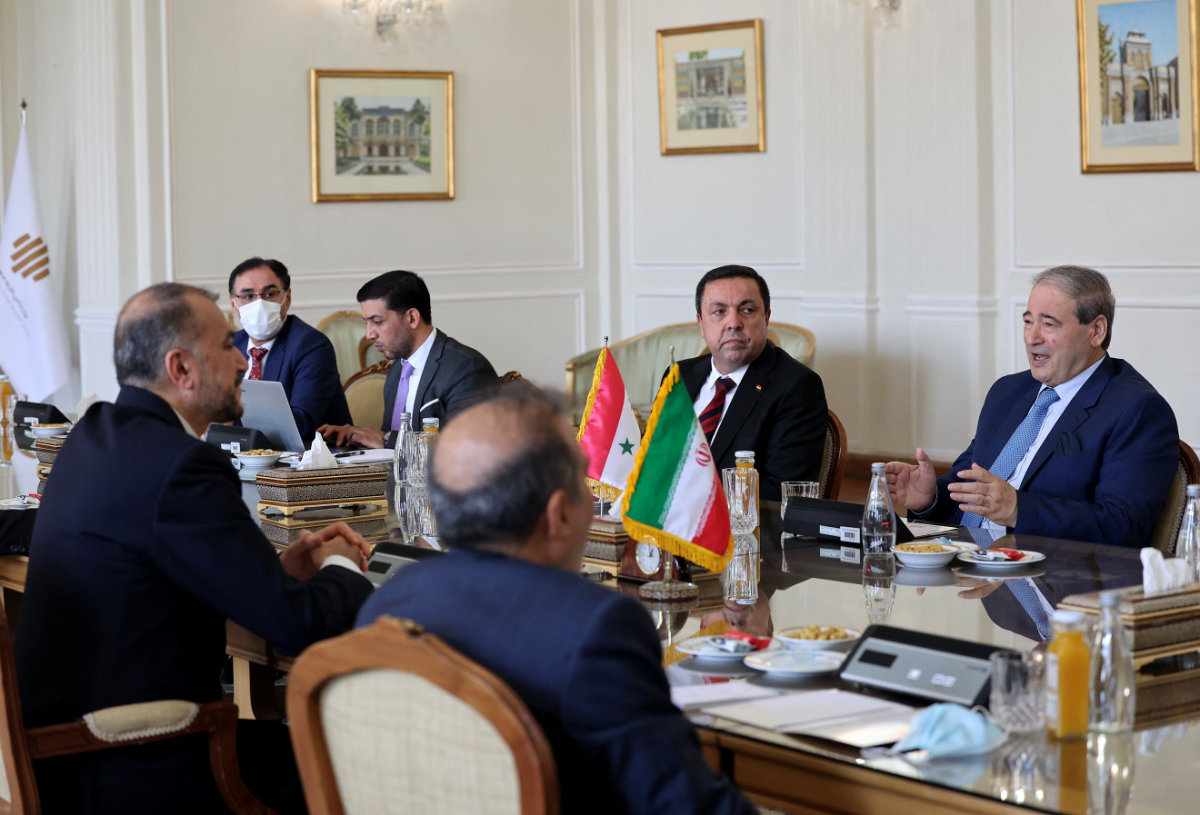
Iran’s Foreign Minister Hossein Amir-Abdollahian meets his Syrian counterpart Faisal Mekdad in Tehran. (AFP)
“It’s clear that the Islamic Republic is overseeing multiple missions in Syria,” he said. “These include not just bolstering the Assad regime and Hezbollah fighters operating in the country, but also using the Quds Force to pose a clear and present threat to Israel. That’s where the reports of what Unit 840 in Syria is doing matter most.”
Put differently, he said: “If the past, plus evolving Iranian military capabilities, is prologue, then the unmanned aerial threats space is something the Quds Force will look to deepen in Syria.”
Ben Taleblu’s assessment of the IRGC’s strategy squares with that of Jason Brodsky, director of United Against a Nuclear Iran, a non-partisan think tank in New York City.
He believes the Quds Force, and its specialized units tasked with conducting terror attacks against Israelis worldwide, will continue to view Syria as a critical base of operations, as the Russian military presence in Syria is scaled back owing to the military stalemate in Ukraine.
However, Israel has formulated a specific doctrine meant to outflank and outmaneuver the Iranians, according to Brodksy.
“There is a distinct possibility that the Quds Force, including Unit 840, will seek to expand its presence in Syria. This is because of Russia’s ongoing transfer of military assets to Ukraine, which will create a vacuum that Iran will seek to exploit,” he told Arab News.
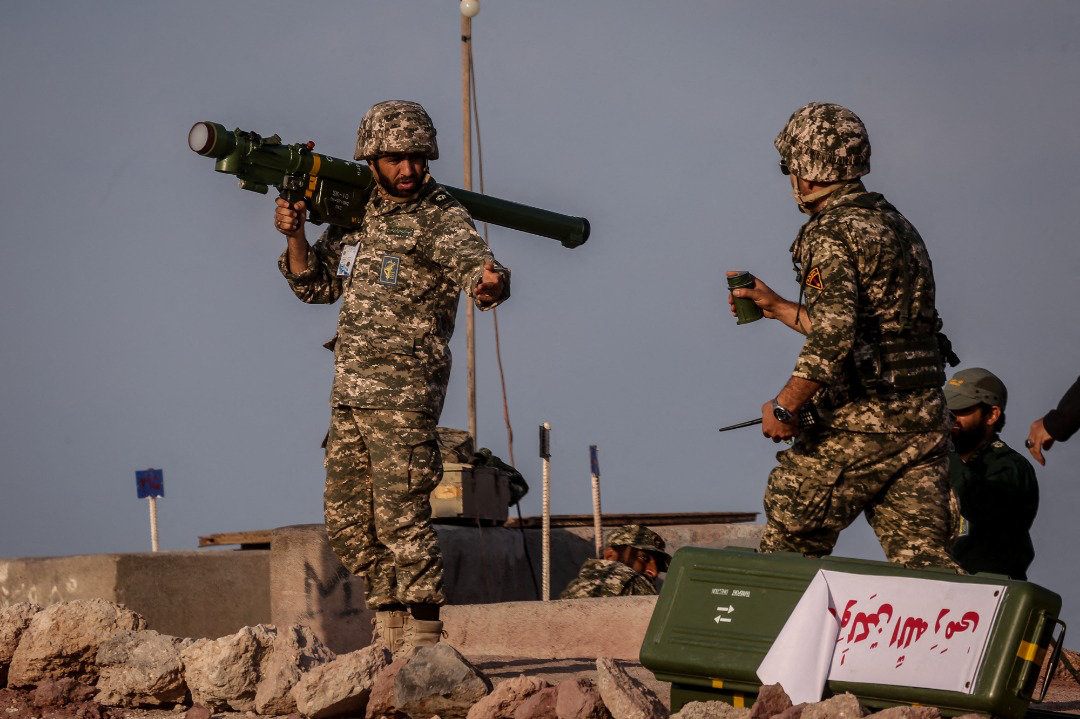
A secretive operational branch of the IRGC’s elite Quds Force, Unit 840, is said to be in charge of plotting external attacks against Israel. (AFP file photo)
“The Khodaei operation was meant to send a message to Tehran that Israel will not hesitate to reach deep inside Iranian territory to exact a price for non-nuclear malign behavior like terrorism. It is an implementation of the Octopus Doctrine, which has long been championed by Israel’s prime minister.”
Although it would have preferred to sit out the Israel-Iran shadow war, the US has frequently found itself in the crosshairs of IRGC proxies alongside its regional partners.
A series of American strikes in August targeted Fatemiyoun Brigade facilities in Deir Ezzor and the base of an IRGC-backed militant group just west of the Euphrates River that was believed to be behind a spate of drone and missile attacks against the US military bases in eastern Syria.
In recent times, Shiite militias seem to have become increasingly bold in hitting US bases in the arid flat desert landscape of the Syrian-Iraqi border.
Compared with Israel, US military retaliation in Syria against attacks by Iranian proxies is usually less aggressive and more geographically precise. Still, the Americans and the Israelis coordinate with each other when they launch attacks against the IRGC in Syria, according to a Wall Street Journal report.
Iran’s military and intelligence networks in Syria were established with meticulous care by the slain Quds Force commander Qassem Soleimani.
“Soleimani had the unique ability to manage Iran’s proxy and partner network,” Brodsky told Arab News. “More than two years after his death, Tehran is still struggling to rebuild a durable management structure for this network.”
